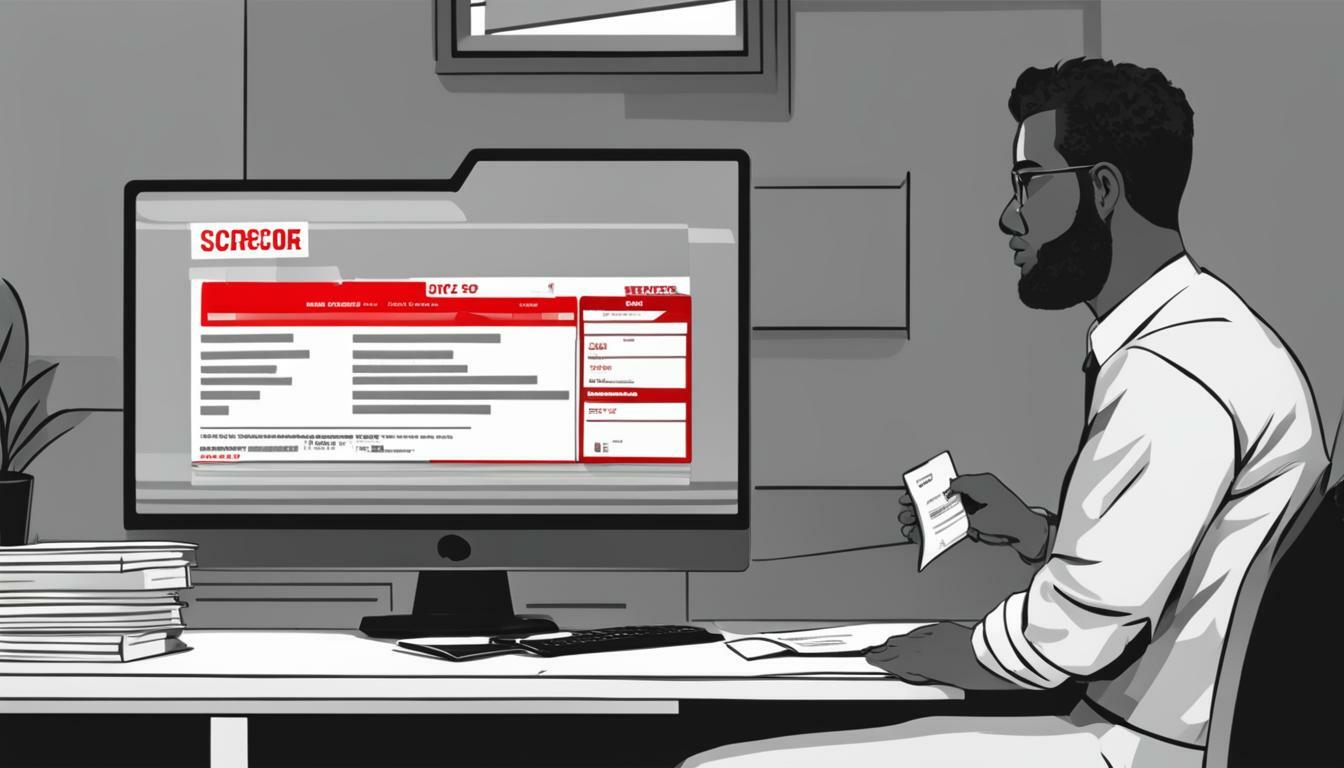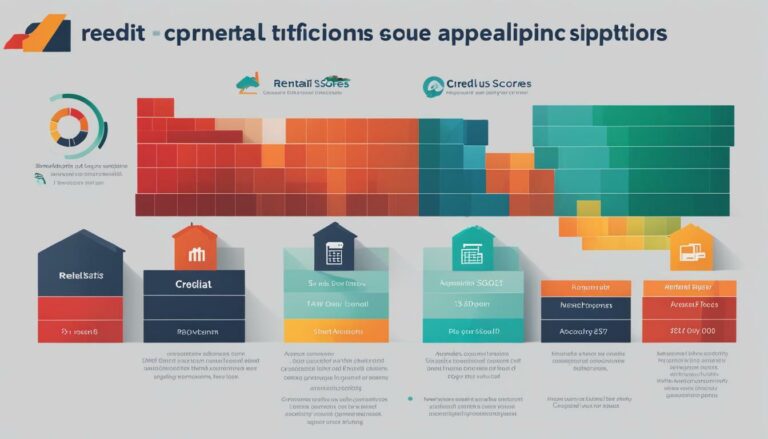Uncovering the Influence of Credit Scores on Job Prospects

Credit scores play a significant role in shaping job prospects and can have a lasting impact on your career advancement. Many employers use credit checks during the hiring process to assess a candidate’s creditworthiness and financial history. A low credit score can be perceived negatively, raising concerns about your ability to handle money responsibly. It is important to understand how credit scores can influence job opportunities and take steps to improve your financial health.
Key Takeaways:
- Your credit score can affect your job prospects as employers often consider it during the hiring process.
- A low credit score may raise concerns about financial responsibility and hinder your chances of employment.
- Employers use credit reports to evaluate your financial history and creditworthiness.
- Responsible financial management is crucial, especially for roles involving handling funds or confidential information.
- Improving your credit score can be achieved by making timely repayments, paying off balances, and managing debt responsibly.
Understanding the Impact of Credit Scores on Hiring Decisions
Employers often rely on credit scores and reports to make hiring decisions, viewing low credit scores as a potential red flag for financial irresponsibility. A low credit score may lead employers to question a candidate’s ability to manage money and may even give preference to other candidates with higher credit scores. Credit reports provide employers with valuable information about a candidate’s financial history and creditworthiness, helping them assess the candidate’s trustworthiness and judgment.
According to a study conducted by the Society for Human Resource Management, approximately 47% of employers in the United States conduct credit checks on potential hires. These checks are particularly common in industries that require employees to handle finances or sensitive information, such as banking, accounting, and government positions. Through credit checks, employers can identify any signs of financial irresponsibility, such as missed payments or outstanding debts, that may pose a risk to the company.
When it comes to hiring decisions, credit scores can play a significant role in the overall evaluation of a candidate. A low credit score may lead employers to question an individual’s ability to handle financial responsibilities, potentially hindering career advancement opportunities. It is important for job seekers to be proactive in managing their creditworthiness, as a good credit score can enhance their chances of landing a desired job or promotion.
🚨 TUIC Errors + Low Credit Score?
CreditScoreIQ helps you build credit faster by reporting utility bills to all 3 bureaus—while you dispute errors.
Start Building Credit Today →| Pros of a High Credit Score for Job Seekers | Cons of a Low Credit Score for Job Seekers |
|---|---|
|
|
It is worth noting that not all states in the U.S. allow employers to use credit scores as a basis for hiring decisions. Therefore, job seekers should familiarize themselves with relevant laws and regulations in their state to understand their rights and protections. While credit scores can have an impact on hiring decisions, individuals can take steps to improve their creditworthiness, such as making timely repayments, reducing debt, and managing credit responsibly. By proactively managing their financial health, job seekers can enhance their chances of success in today’s competitive job market.
References:
- Society for Human Resource Management (SHRM) – Background Checking: The Implications of Credit Background Checks on Hiring Practices
- Consumer Financial Protection Bureau (CFPB) – Using Credit Information in Employment

Boosting your creditworthiness is crucial for job applications and career advancement, and it can be achieved through responsible financial management and proactive steps to improve your credit scores. When it comes to job prospects, having a good credit score can make a significant difference. Many employers use credit checks as a way to evaluate a candidate’s financial responsibility and trustworthiness. By taking control of your financial health and improving your credit scores, you can enhance your chances of securing employment and advancing in your career.
One of the first steps towards improving your creditworthiness is ensuring that you make timely repayments on all your financial obligations. This includes credit card bills, loan payments, and utility bills. Late or missed payments can have a negative impact on your credit scores, so it’s important to stay organized and pay your bills on time. Creating a budget and setting reminders for payment due dates can help you stay on track.
| Responsible Financial Management Tips | Benefits |
|---|---|
| Pay off outstanding balances | Reduces your credit utilization ratio and improves your credit scores |
| Manage debt responsibly | Demonstrates your ability to handle financial obligations |
| Regularly review your credit reports | Allows you to identify and dispute any inaccuracies |
| Limit new credit applications | Minimizes the number of hard inquiries on your credit report |
Another essential aspect of responsible financial management is paying off outstanding balances. By reducing your credit utilization ratio (the amount of credit you’re using compared to your total available credit), you can significantly improve your credit scores. Aim to keep your credit card balances low and pay off any high-interest debts as soon as possible.
Regularly reviewing your credit reports is also important. It allows you to identify any inaccuracies or fraudulent activities that may be negatively affecting your credit scores. Remember, you are entitled to a free credit report from each of the major credit bureaus once a year. Take advantage of this opportunity to ensure the information on your reports is accurate and up to date.
Quotes:
“Improving your creditworthiness not only enhances your job prospects but also establishes a solid foundation for your financial future.”
Lastly, limit new credit applications unless absolutely necessary. Applying for multiple lines of credit within a short period can result in multiple hard inquiries on your credit report, which can temporarily lower your credit scores. Be selective when applying for new credit and only do so when you genuinely need it.
In conclusion, boosting your creditworthiness is crucial for job applications and career advancement. By practicing responsible financial management and taking proactive steps to improve your credit scores, you can enhance your chances of securing employment and advancing in your chosen field. Remember, not all states allow employers to use credit scores in hiring decisions, but it’s always beneficial to maintain a good credit history and manage your finances responsibly.

In conclusion, credit scores wield substantial influence on job prospects, making it essential to prioritize financial responsibility and actively manage your creditworthiness. Employers often use credit checks as a way to assess a candidate’s financial history and creditworthiness. A low credit score can be perceived as a sign of financial irresponsibility, which may make employers question an individual’s ability to handle money and make sound financial decisions.
Furthermore, credit reports provide employers with valuable insights into an applicant’s financial habits and behavior. Instances of bankruptcies, missed payments, neglected credit cards, or high balances can be seen as red flags and may lead employers to favor candidates with better credit histories.
It is important to note that in some cases, employers conduct credit checks to mitigate legal liability associated with negligent hiring, particularly in financial institutions. Therefore, meeting employers’ expectations for responsible financial management is crucial, especially for roles that involve managing funds or dealing with confidential information.
To boost your creditworthiness, it is advisable to make timely repayments, pay off outstanding balances, and manage your debts responsibly. By actively managing your credit, you can demonstrate financial responsibility and increase your chances of securing employment opportunities that align with your career aspirations.
FAQ
Q: Can low credit scores affect my job prospects?
A: Yes, many employers use credit checks when hiring employees, and low credit scores can be seen as a sign of financial irresponsibility. This may lead employers to question your ability to handle money.
Q: What information do employers look for in credit reports?
A: Employers may look for signs of bankruptcies, missed payments, neglected credit cards, and high balances. These behaviors can be seen as a risk to the company and may give other candidates an advantage.
Q: How can I improve my creditworthiness?
A: You can boost your credit scores by making timely repayments, paying off balances, and managing debt responsibly. It is important to meet employers’ expectations for responsible financial management, especially for roles that involve managing funds or dealing with confidential information.
Q: Are credit scores used in hiring decisions in all states?
A: No, not all states in the U.S. allow employers to use credit scores as a basis for hiring decisions. It is important to be aware of the laws and regulations in your state regarding the use of credit scores in employment.
Ready to Improve Your Credit?
Disputing TUIC errors is step one. Step two? Boost your score by reporting utility payments with CreditScoreIQ.
Get Started Now (Only $1 Trial) →3-bureau reporting • $1M identity insurance • Dark web monitoring






